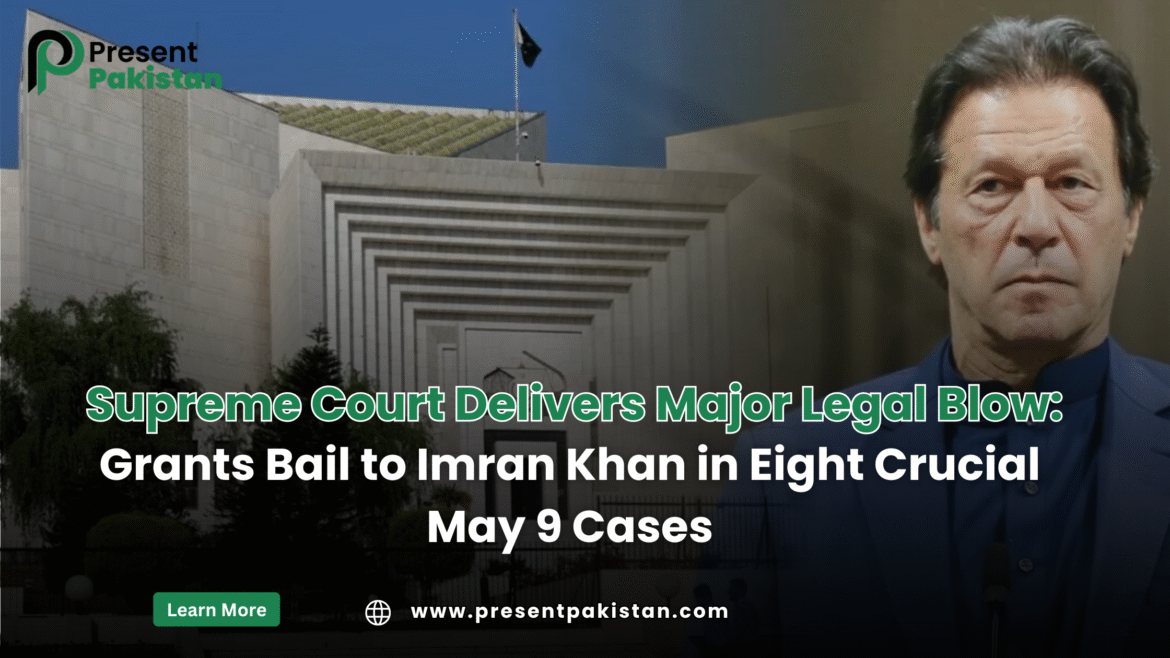The Supreme Court Delivers Major Legal Blow has rendered an unprecedented legal decision allowing bail for Imran Khan in eight significant May 9 cases. Stay informed of the ramifications and risks politically, and whether this historic news blog can transform into the future.
Imran Khan Bail Verdict: A Landmark Shift
Supreme Court of Pakistan’s Historic Legal Blow: Imran Khan, after a ruling providing bail in eight other significant May 9 cases, has reaffirmed the continued process of transforming the legal and political realities of Pakistan. This historical August ruling in 2025 will be of inestimable value for Imran Khan’s future and the previously disconnected roles between the judiciary, politics, and governance in Pakistan; this historic legal ruling is more than just about bail, it is about Imran Khan’s current powerful hold as a leader of accountability and democratic accountability and the future viability of institutions in Pakistan.
We will gather everything possible about this monumental ruling in this long-form blog: we’ve planned to examine the legal context politically, consider the implications and other responses from all possible perspectives, and look at future (potential) possibilities for Pakistan.
Table of Contents
- Background: Why the May 9 Cases Matter
- Supreme Court’s Verdict Explained
- Legal Reasoning Behind the Bail
- Political Reactions: PTI, Government, and Opposition
- Public Sentiment and Media Narratives
- The Market Reaction: Economy and Stability
- Supreme Court Delivers Major Legal Blow
- Imran Khan’s Legal Challenges Still Ahead
- Broader Impact on Pakistan’s Judiciary and Democracy
- International Reactions and Global Coverage
- Future Scenarios: What Comes Next?
- FAQs
- People Also Ask
- Conclusion
- Stay Updated with Present Pakistan
Background: Why the May 9 Cases Matter
The events of May 9, 2023, represented a watershed moment within the political history of Pakistan. The protests, as well as the attacks on state assets and state officials, began an immediate legal process that is still ongoing today. Imran Khan, as the head of the Pakistan Tehreek-e-Insaf (PTI), was already being accused of inciting mobs to violence and has multiple accusations filed against him as a part of ordinary criminal law.
Key Points:
- The protests of May 9 were, in effect, one of the most historic days in Pakistan’s political history.
- The May 9 cases represent state power versus political opposition.
Supreme Court’s Verdict Explained
The Supreme Court’s recent verdict to release Imran Khan on bail in eight cases related to May 9 is not a small step; it’s a big step that has sent shockwaves through both the government and opposition. The three-member bench of the court found inconsistencies in the judgment of others and highlighted the need for fairness and equality before the law.
Key Points:
- Bail was granted in eight prominent cases related to the protests on May 9.
- This was a complete reversal of the previous bail denial by the Lahore High Court.
Legal Reasoning Behind the Bail
The Supreme Court approached the question using the principle of legal consistency: if others have received bail in similar circumstances, and unless there is good reason for creating a precedent that treats Khan differently, there is no reason for the judiciary to create unfairness.
Key Points:
- The foundation of the decision was equality before the law.
- Bail is not acquittal; the trial goes on.
Political Reactions: PTI, Government, and Opposition
PTI hailed the decision as “a win for Imran Khan” and a positive moment for democracy. Government officials expressed concern over judicial activism, while opposition parties seemed splintered.
Key Points:
- PTI called the ruling a people’s victory.
- The government is cautious; there are ongoing cases.
Public Sentiment and Media Narratives
Within hours, trending hashtags were emerging on social media, like #VictoryForImranKhan. Television stations began nonstop coverage analyzing every element of the ruling, with pundits debating whether this is a step towards strengthening democracy or deepening a rift in the political landscape in Pakistan.
Key Points:
- Public opinion is deeply divided.
- Within the social discourse, we already have commentators observing the political and military existence, contemplating the indictment and to what extent it is a punishment, and news organizations have described the ruling as a monumental occasion in the political history of Pakistan.
The Market Reaction: Economy and Stability
The stock exchange in Pakistan fell more than 1,300 points because of fear. With political uncertainties further adding to concerns about investor confidence, some judicial relief was not a cure.
Key Points:
- Economic markets can often have a dramatic response to political shocks.
- The bail decision did not lessen economic uncertainty.
Supreme Court Delivers Major Legal Blow
Supreme Court Delivers Major Legal Blow: Grants Bail to Imran Khan in Eight Crucial May 9 Cases captures the essence of the story: a monumental legal decision with widespread consequences.
Key Points:
- Supreme Court Delivers Major Legal Blow reflects legal and political impact.
- This ruling may set a precedent for similar cases.
Imran Khan’s Legal Challenges Still Ahead
Even though granted bail in 9 cases in May, Khan is still in jail because of other cases with convictions lying in wait, such as the Al-Qadir Trust and Toshakhana reference. The forecast regarding Khan’s legal future remains opaque.
Key Points:
- Bail does not mean freedom; other cases are still proceeding.
- If Khan wants to return to the political front, the outlook will depend on future trials.
Broader Impact on Pakistan’s Judiciary and Democracy
The ruling begs to differ on some aspects of the coordination of the judiciary and political actors and can be perceived at once both as an independence from political pressures and as political pressures.
Key Points:
- Judgment characterizes the function of the judiciary as balancing competing interests.
- Engages ideas about the separation of powers.
International Reactions and Global Coverage
Foreign media portrayed the decision as a significant shift in Pakistan’s political drama. The headlines from Asia, Europe, and the US regarding the bail depicted both relief and risk.
Key Points:
- International attention on the political crisis in Pakistan.
- Global analysts are cautious about stability in South Asia.
Future Scenarios: What Comes Next?
A range of future scenarios is possible: PTI returns, the government could crack down on opposition, elections might happen before a term is complete, etc. Whatever happens will affect the next democratic chapter in Pakistan.
Key Points:
- The future scenario will depend on the weight of military, judiciary, and political actors.
- The fate of India Khan is uncertain.
FAQs
Q1. Does the Supreme Court’s granting of bail to Imran Khan signify anything?
It signifies that Imran Khan will no longer be held in these eight May 9 cases, but he still has other convictions against him.
Q2. Is Imran Khan now a free man after this decision?
No. He is still incarcerated due to other cases, for instance, Al-Qadir Trust and Toshakhana.
Q3. Why was bail granted now?
The court pointed out that there should be consistency and fairness; others were also granted bail in similar cases.
Q4. How did PTI respond to the decision?
PTI referred to it as a “people’s victory” and threw celebrations across the country.
Q5. What does this mean for Pakistan’s politics?
It raises political competition and could change the nature of the upcoming elections.
People Also Ask
1. What is the implication of the May 9 cases for Imran Khan?
The May 9 cases are a state opposition to the street might of PTI. They are the broader war between the political opposition and the state’s might.
2. Will Imran Khan be back to contest the upcoming elections after this bail?
It hinges on turns of events in other cases. If disqualifications hold, he cannot challenge—though political pressure could alter the calculus.
3. What was the response of the stock market to Imran Khan’s decision on bail?
The KSE-100 index fell precipitously, showing rejection of economic optimism under political instability.
4. Does the Supreme Court judgment prove judicial independence?
Yes, claim its proponents, since the Court vindicated justice. Politicians respond negatively, attributing the decision to politics.
5. What is the international perception of this decision?
International media regard it as a milestone but caution against Pakistan’s fragile stability.
Conclusion
The Supreme Court’s decision to grant bail to Imran Khan in eight May 9 cases is a landmark legal and political moment. While it offers temporary relief, the journey ahead remains fraught with challenges, both for Khan and for Pakistan. The story is far from over; this is just one chapter in an unfolding saga of democracy, power, and justice.
Stay Updated with Present Pakistan
Stay informed with the most credible updates on Pakistan’s politics, judiciary, and governance. For in-depth analysis and real-time news, visit Present Pakistan







